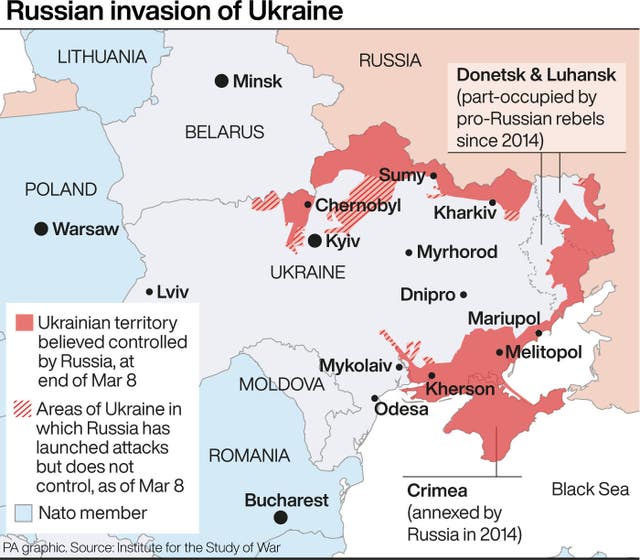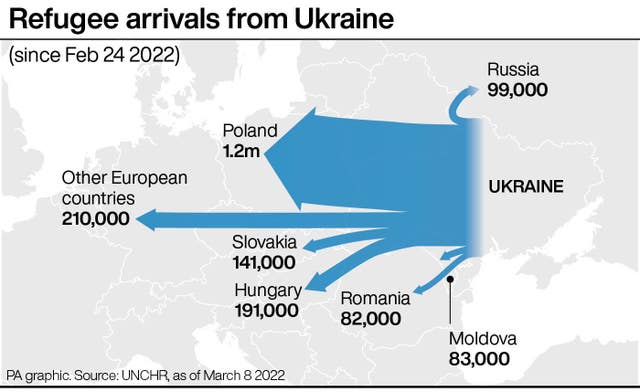No breakthrough on ending war in Ukraine-Russia talks between top diplomats
The talks happened after an air strike on a hospital in the port city of Mariupol killed three people, including a child, the city’s council said.

Ukraine’s foreign minister said talks between the top diplomats of Moscow and Kyiv produced no breakthrough on ending the war following Russia’s invasion.
Ukrainian foreign minister Dmytro Kuleba said he attended the meeting on Thursday with Russian counterpart Sergei Lavrov in Turkey to discuss humanitarian corridors and a ceasefire.
Mr Kuleba said there are “other decision-makers” in Russia who need to be consulted, adding that he agreed with Mr Lavrov to continue to seek a solution to humanitarian issues caused by the war.
He said Moscow is not ready to offer a ceasefire, adding: “They seek Ukraine’s surrender. This is not going to happen.”

Mr Kuleba said “the last thing” he wanted was to kill hope for Ukrainians seeking safe passage out of cities besieged by Russian bombardments and attacks.
The talks happened after an air strike on a hospital in the port city of Mariupol killed three people, including a child, the city’s council said, as Russian forces intensified their siege of Ukrainian cities.
The attack a day earlier in the besieged southern port city wounded 17 people, including women waiting to give birth, doctors, and children buried in the rubble. Bombs also fell on two hospitals in another city west of the capital.
The World Health Organisation (WHO) said it has confirmed 18 attacks on medical facilities since the Russian invasion began on February 24.

Speaking after the talks in Turkey, Mr Lavrov dismissed concerns about Russian military attacks on civilians, including on a maternity hospital, as “pathetic shrieks” from its enemies.
In the Russian government’s first public comment on Wednesday’s strike in Mariupol, Mr Lavrov did not deny or shy away from responsibility for the attack.
He claimed the site had earlier been seized by Ukrainian far-right radical fighters who were using it as a base.
Even though there were many images of civilians wounded in the attack, Mr Lavrov claimed all the patients and nurses were moved out of the hospital before the assault.
Mr Lavrov said Russia was ready for more negotiations but showed no sign of softening Moscow’s stance in the dispute.
Ahead of the talks, artillery fire was heard on the western edge of Kyiv, deputy interior minister Vadym Denysenko said.

He told Ukrainian TV channel Rada that residents had a “rather difficult” night on the outskirts of the capital, with Russian forces starting by targeting military sites but then hitting residential areas.
The city’s mayor, Vitali Klitschko said about two million people – half the residents of the metro area of the capital – have left the city, which has become virtually a fortress.
He said: “Every street, every house… is being fortified, the territorial defence is joining. Even people who in their lives never intended to change their clothes, now they are in uniform with machine guns in their hands.”
Some Ukrainian officials have called the medical facility attacked on Wednesday a children’s hospital, while others have called it a maternity unit. It was not clear if perhaps it hosted both services.
The ground shook more than a mile away when the series of blasts hit.
Explosions blew out windows and ripped away much of the front of one building.
Police and soldiers rushed to the scene to evacuate victims. Another woman cried as she clutched her child. In the courtyard, a blast crater extended at least two floors deep.
“Today Russia committed a huge crime,” said Volodymir Nikulin, a top regional police official, standing in the ruins. “It is a war crime without any justification.”
President Volodymyr Zelensky said the Mariupol strike trapped children and others under debris.
“A children’s hospital. A maternity hospital,” he said in his nightly video address, switching to Russian to express horror at the strike.
“What kind of country is this, the Russian Federation, which is afraid of hospitals, afraid of maternity hospitals, and destroys them?”
Sharing video that showed cheerfully painted hallways strewn with twisted metal, Mr Zelensky urged the West to impose even tougher sanctions than the ones that have already plunged Russia’s economy into severe isolation, so that it “no longer has any possibility to continue this genocide”.
Speaking on Thursday, Mr Zelensky told Russian leaders that the invasion will backfire on them as their economy is strangled.

“You will definitely be prosecuted for complicity in war crimes,” he said in a video address. “And then, it will definitely happen, you will be hated by Russian citizens — everyone whom you have been deceiving constantly, daily, for many years in a row, when they feel the consequences of your lies in their wallets, in their shrinking possibilities, in the stolen future of Russian children.”
Russian President Vladimir Putin dismissed such talk, saying the country has endured sanctions before.
″Just as we overcame these difficulties in the previous years, we will overcome them now,” he said at a televised meeting of government officials.
He did, however, acknowledge the sanctions create “certain challenges”.
Britain’s armed forces minister James Heappey said the strike in Mariupol “is a war crime” whether it was deliberate or the result of “indiscriminate” fire into a built-up area.
On Thursday, Britain added more oligarchs to its sanctions list, including the owner of Chelsea FC Roman Abramovich.

In Zhytomyr, a city of 260,000 to the west of Kyiv, bombs fell on two hospitals, one of them a children’s hospital, mayor Serhii Sukhomlyn said on Facebook. He said there were no injuries.
The WHO said it has confirmed 10 people have been killed and 16 injured in attacks on health facilities and ambulances since the fighting began. It was not clear if its numbers included the assault on the hospital in Mariupol.
Two weeks into Russia’s assault on Ukraine, its military is struggling more than expected, but President Vladimir Putin’s invading force of more than 150,000 troops retains possibly insurmountable advantages in firepower as it bears down on key cities.
Despite often heavy shelling on populated areas, American military officials reported little change on the ground over the previous 24 hours, other than Russian progress against the cities of Kharkiv and Mykolaiv, in heavy fighting.
Authorities announced new ceasefires to allow thousands of civilians to escape bombarded towns.
Mr Zelensky said three humanitarian corridors operated on Wednesday, from Sumy in the north-east near the Russian border, from suburbs of Kyiv and from Enerhodar, the southern town where Russian forces took over a large nuclear power station.
In all, he said, about 35,000 people got out. More evacuations were planned for Thursday from towns and cities under bombardment in eastern and southern Ukraine — including Mariupol — as well as the Kyiv suburbs.

People streamed out of Kyiv’s suburbs a day earlier, many headed for the city centre, as explosions were heard in the capital and air raid sirens sounded repeatedly. From there, the evacuees planned to board trains bound for western Ukrainian regions not under attack.
Civilians leaving the Kyiv suburb of Irpin were forced to make their way across the slippery wooden planks of a makeshift bridge, after the Ukrainians blew up the concrete span leading to Kyiv days ago to slow the Russian advance.
With sporadic gunfire echoing behind them, firefighters dragged an elderly man to safety in a wheelbarrow, a child gripped the hand of a helping soldier, and a woman inched her way along, cradling a fluffy cat inside her winter coat. They trudged past a crashed van with the words “Our Ukraine” written in the dust coating its windows.
Previous attempts to establish safe evacuation corridors over the past few days largely failed because of what the Ukrainians said were Russian attacks.
Mr Putin, in a telephone call with Germany’s chancellor, accused militant Ukrainian nationalists of hampering the evacuations.
International Red Cross spokesman Jason Straziuso said safe passage corridors are welcome but have to be well planned, with details agreed on by all sides including the right to bring in food, clean water, medical supplies and other necessities.
Such guarantees are vital for places such as Mariupol, a city of 430,000 on the Sea of Azov, where Mr Zelensky’s office said about 1,200 people have died during the nine-day siege.

“We haven’t been able to resupply our teams in recent days in Mariupol, for example,” Mr Straziuso said.
Local authorities hurried to bury the dead from the past two weeks of fighting in a mass grave in the city. Workers dug a trench some 25 metres long at one of the city’s old cemeteries.
Nationwide, thousands are thought to have been killed, both civilians and soldiers, since Mr Putin’s forces invaded. The UN estimates more than two million people have fled the country, the biggest exodus of refugees in Europe since the end of the Second World War.
The fighting knocked out power to the decommissioned Chernobyl nuclear plant on Wednesday, raising fears about the spent radioactive fuel stored there that must be kept cool. But the UN nuclear watchdog agency said it saw “no critical impact on safety” from the loss of power.
The Biden administration warned Russia might seek to use chemical or biological weapons in Ukraine and rejected Russian claims of illegal chemical weapons development there.
This week, Russian Foreign Ministry spokeswoman Maria Zakharova — without evidence — accused Ukraine of running chemical and biological weapons labs with US support.
White House press secretary Jen Psaki called the claim “preposterous” and said Russia might be trying to lay the groundwork for its own use of such weapons against Ukraine.





